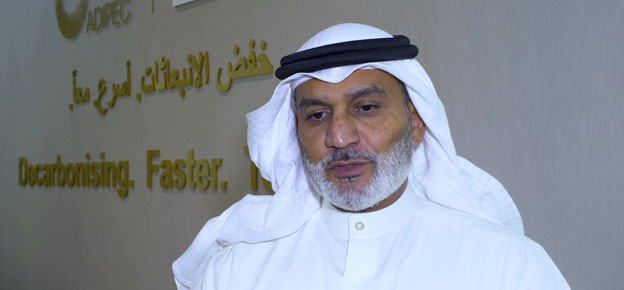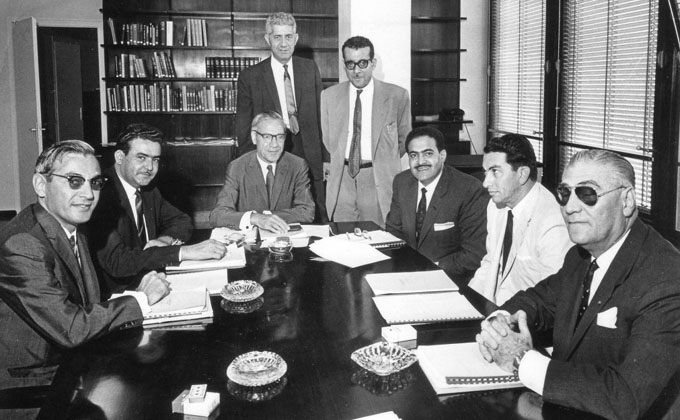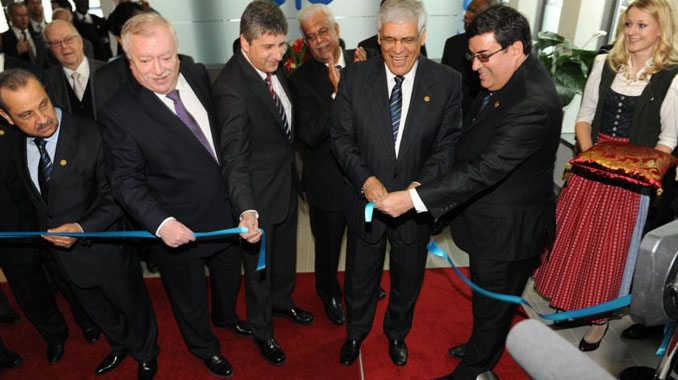
HE Haitham Al Ghais, OPEC Secretary General
Sixty-five years ago, visionary leaders from five developing nations, namely Abdullah al-Tariki of Saudi Arabia, Juan Pablo Pérez Alfonzo of Venezuela, Fuad Rouhani of Iran, Tala’at al-Shaibani of Iraq, and Ahmed Sayed Omar of Kuwait, founded OPEC at the historic Baghdad Conference from 10 to 14 September 1960.
With the benefit of hindsight, some might view the foundation of OPEC as inevitable, but that was not the case. The Organization’s Founder Members each arrived in Baghdad with different objectives, expectations and priorities, yet they all recognized that a core set of common interests outweighed any differences.
Back then, the economies of these developing countries were centred around oil, an industry that was dominated by powerful outside interests in the shape of the leading international oil companies of the day. The countries had no decision-making powers as to how their own oil industries were run, or how their oil was sold on world markets.
It was a situation that needed to change, as the system in place was depriving the countries of the best means of generating the revenue they needed to develop their own economies and provide for their citizens. The founding of OPEC was a triumph of cooperation, dialogue and compromise, steeped in the iron will of the Founders to assert their sovereign rights to exploit their natural resources for their national development, and to help promote market stability, in the interests of both producers and consumers.
This is all clear in the first resolution adopted at OPEC’s Baghdad meeting in September 1960. It stated: “The principal aim of the Organization shall be the unification of petroleum policies for the Member Countries and the determination of the best means for safeguarding the interests of Member Countries individually and collectively,” and to pay “due regard to the interests of the producing and of the consuming nations and to the necessity of securing a steady income to the producing countries, an efficient, economic and regular supply of this source of energy to consuming nations, and a fair return on their capital to those investing in the petroleum industry.”
It was also a stepping-stone for these countries, and others that joined in the 1960s, to further assert their interests in the face of continuing resistance from the oil majors. Other steps soon followed, including the ‘Declaratory Statement of Petroleum Policy in Member Countries’ in June 1968, which helped lay a platform for further landmark agreements in the early 1970s, such as Tehran, Tripoli, Geneva I and Geneva II. These milestones constituted defining acts in the realignment of the oil industry, resulting in a more equitable balance between the interests of producing and consuming countries.
Like all international organizations, however, there have been ups and downs for the Organization since its early days. Indeed, many column inches have been written about OPEC, both favourable and unfavourable, objective and subjective, and OPEC’s death certificate has even been wrongly prescribed on several occasions.
It is evident that people have strong views about the Organization, some of which may be the result of misunderstandings and misconceptions about the true nature of OPEC and its Member Countries. In this regard, it is important to look at a world with and without OPEC, and the benefits the Organization brings.
For example, two papers from 2021 underscore the importance of OPEC to the oil market and the global economy. The first from KAPSARC, entitled, ‘The Value of OPEC’s Spare Capacity to the Oil Market and Global Economy,’ investigates the extent to which OPEC has succeeded in its self-stated mission of stabilizing the oil market and the implications for the world’s economy. It estimates the annual value of OPEC’s spare capacity to the world’s economy at 193.1 billion in 2019 US dollars.
The second from the Oxford Institute for Energy Studies is entitled, ‘OPEC at 60: The World With and Without OPEC’. From a historical perspective, it analyzes the period from 1990 to 2018 and highlights that in the absence of OPEC’s spare capacity – in particular, from Saudi Arabia – the cost of supply shortfalls leads to increasingly negative impacts on global GDP across time, with a level of US$185 billion highlighted for 2011. The paper stresses that supply shocks would have been significantly larger and more persistent if OPEC had not existed.
The importance of market stability can also be viewed in the fact that oil remains vital to almost every facet of daily life. Societal and economic prosperity depend on oil and petroleum-derived products. Without them, cars, buses, trucks and lorries would be stranded, airplanes would be grounded, the construction sector would all but grind to a halt, food production would be devastated, and health products would be difficult to produce.
OPEC’s unifying vision and core objectives from 1960 have driven the Organization over the past six-and-a-half decades, proving truly timeless and serving as a stable foundation stone. Today, OPEC has 12 Member Countries and is respected far and wide as an established part of the international energy community and multilateral system. The Organization was in fact registered at the United Nations Secretariat on 6 November 1962.
Additionally, over the years OPEC has developed and pursued a variety of ‘International Energy Dialogues’ with major consumers, non-OPEC producers, other international organizations, and many other industry stakeholders. The Organization has also participated in every meeting of the COP since they first began more than thirty years ago and will continue to do so going forward.
OPEC has grown in stature and become a household name in the field of energy. This was further enhanced in late 2016 when it joined with a number of non-OPEC producers through the Declaration of Cooperation (DoC), or OPEC-plus, a group that was central to helping the oil industry, and the global economy, overcome the huge ramifications of the COVID-19 pandemic.
Looking ahead, oil will remain vital in the future, with OPEC’s latest World Oil Outlook 2025 seeing oil demand rising to around 123 million barrels a day by 2050. This expansion is driven by the fact that the world will need more energy as economies and populations expand. Energy security for all is critical and is inconceivable without oil.
Moreover, with billions of people in the developing world continuing to be impacted by energy poverty, it is vital to look at how this growth can be achieved in a sustainable way by all the various energies, balancing the needs of people in relation to their social welfare, the economy and the environment. The focus must be on an all-energies, all-technologies and all-peoples approach.
Just as in 1960, OPEC believes in prudent and realistic approaches to tackle the energy challenges and opportunities before us, with market stabilization efforts remaining to the fore, as we all look to chart appropriate future energy pathways for nations and peoples worldwide.
While the future is never easy to predict, OPEC’s history and rising energy and oil demand suggest that any claims of the Organization’s waning importance, or indeed any predictions of peak oil in the coming decades, should be taken with a grain of salt.
On this 65th Anniversary, I would like to offer my sincerest thanks and congratulations to all our Member Countries, their honourable leaders, as well as other officials and OPEC staff, both past and present, who have helped evolve the Organization into what we see today.
OPEC has, and will continue to be a source of stability; a vital cog in the energy industry landscape; and a voice that underscores the importance of oil and petroleum products to the world in the decades to come.
As we celebrate OPEC’s 65th Anniversary and its past successes and achievements, we look forward to a future in which OPEC is here to stay for another 65 years and more.
History
The Organization of the Petroleum Exporting Countries (OPEC) is a permanent, intergovernmental Organization, created at the Baghdad Conference on September 10–14, 1960, by Iran, Iraq, Kuwait, Saudi Arabia and Venezuela. The five Founding Members were later joined by: Qatar (1961) – terminated its membership in January 2019; Indonesia (1962) – suspended its membership in January 2009, reactivated it in January 2016, but decided to suspend it again in November 2016; Libya (1962); United Arab Emirates (1967); Algeria (1969); Nigeria (1971); Ecuador (1973) – suspended its membership in December 1992, reactivated it in October 2007, but decided to withdraw its membership effective 1 January 2020; Angola (2007) – withdrew its membership effective 1 January 2024; Gabon (1975) – terminated its membership in January 1995 but rejoined in July 2016; Equatorial Guinea (2017); and Congo (2018). OPEC had its headquarters in Geneva, Switzerland, in the first five years of its existence. This was moved to Vienna, Austria, on September 1, 1965.
OPEC’s objective is to co-ordinate and unify petroleum policies among Member Countries, in order to secure fair and stable prices for petroleum producers; an efficient, economic and regular supply of petroleum to consuming nations; and a fair return on capital to those investing in the industry.

1st OPEC Conference
The 1960s
OPEC’s formation by five oil-producing developing countries in Baghdad in September 1960 occurred at a time of transition in the international economic and political landscape, with extensive decolonisation and the birth of many new independent states in the developing world. The international oil market was dominated by the “Seven Sisters” multinational companies and was largely separate from that of the former Soviet Union (FSU) and other centrally planned economies (CPEs). OPEC developed its collective vision, set up its objectives and established its Secretariat, first in Geneva and then, in 1965, in Vienna. It adopted a ‘Declaratory Statement of Petroleum Policy in Member Countries’ in 1968, which emphasised the inalienable right of all countries to exercise permanent sovereignty over their natural resources in the interest of their national development. Membership grew to ten by 1969.
The 1970s
OPEC rose to international prominence during this decade, as its Member Countries took control of their domestic petroleum industries and began to play a greater role in world oil markets. The decade witnessed several impactful events that caused volatility in the global oil market to rise steeply. OPEC broadened its mandate with the first Summit of Heads of State and Government in Algiers in 1975, which addressed the plight of the poorer nations and called for a new era of cooperation in international relations, in the interests of world economic development and stability. This led to the establishment of the OPEC Fund for International Development in 1976. Member Countries embarked on ambitious socio-economic development schemes. Membership grew to 13 by 1975.
The 1980s
Demand for energy slumped and oil demand fell in the early part of 1980s, culminating in a market crash in 1986 in response to the oil glut and a consumer shift away from hydrocarbons. OPEC’s share of the smaller oil market fell heavily and its total petroleum revenue dropped, causing economic instability in many Member Countries. In the final part of the decade, the oil market witnessed something of a recovery and OPEC’s share of newly growing world output began to recover. This was supported by OPEC introducing a group production adjustment divided among Member Countries and a Reference Basket for pricing, as well as significant progress with OPEC and non-OPEC dialogue and cooperation, seen as essential for market stability. Environmental issues emerged on the international energy agenda.
The 1990s
Timely OPEC action reduced the market impact of Middle East issues in 1990–91, but excessive volatility dominated the decade. The Southeast Asian economic downturn and mild Northern Hemisphere winter of 1998–99 saw the oil market return to mid-1980 conditions. However, a solid recovery followed and the oil market, which was adjusting to the post-Soviet world, became more integrated, with a focus on globalisation, the communications revolution and other high-tech trends. Breakthroughs in producer-consumer dialogue matched continued advances in OPEC and non-OPEC relations. As the United Nations-sponsored climate change negotiations gathered momentum, after the Earth Summit of 1992, OPEC sought fairness, balance and realism in the treatment of oil supply. One country left OPEC, while another suspended its Membership.
The 2000s
OPEC continued with its efforts to help strengthen and stabilize the global oil market in the early years of the decade. But a combination of market forces, speculation and other factors transformed the situation in 2004, pushing up volatility in a well-supplied crude market. Oil was used increasingly as an asset class. Market volatility continued to increase in an unprecedented manner in early 2008, before the collapse of the global financial sector that led to economic recession. OPEC became prominent in supporting the oil sector, as part of global efforts to address the economic crisis. OPEC’s second and third summits in Caracas and Riyadh in 2000 and 2007 established stable energy markets, sustainable development and the environment as three guiding themes, and it adopted a comprehensive long-term strategy in 2005. One country joined OPEC, another reactivated its Membership and a third suspended it.

Headquarter Opening 2010
2010s
The global economy represented the main risk to the oil market early in the decade, as global macroeconomic uncertainties and heightened risks surrounding the international financial system weighed on economies. Escalating social unrest in many parts of the world affected both supply and demand throughout the first half of the decade, although the market remained relatively balanced. The oil market was stable between 2011 and mid-2014, before a combination of speculation and oversupply caused it to contract. Trade patterns then continued to shift, with global oil demand growing, particularly in the Asian region. The world’s focus on multilateral environmental matters began to sharpen, resulting in the Paris Agreement in 2015, which OPEC Member Countries have all signed and 10 have ratified. OPEC continued to attend the United Nations Framework Convention on Climate Change (UNFCCC) Conference of the Parties (COP) meetings to dialogue and exchange views.
Market conditions led to the emergence of the unprecedented Declaration of Cooperation (DoC) in December 2016, with OPEC Members and 10 non-OPEC oil-producing countries coming together to help rebalance the market, bring down inventory levels and support oil market stability. In 2019, the Charter of Cooperation (CoC) — a long-term platform dedicated to cooperation and the exchange of views and information — was established.
OPEC held its 5th, 6th and 7th International Seminars in 2012, 2015 and 2018, respectively, which brought together an unprecedented number of representatives from producing and consuming nations, national and international oil companies, along with journalists and industry analysts.
OPEC continued to seek stability in the market, and looked to further enhance its dialogue and cooperation with producers, consumers, international organizations, institutions and other industry stakeholders, noting that the need for energy dialogue has never been greater. The decade witnessed more understanding and appreciation of the role that OPEC has played in helping stabilize the global oil market, in the interests of both producers and consumers.
2020s
The new decade began with the unprecedented outbreak of the COVID-19 pandemic, which pervaded almost every aspect of daily lives. The pandemic had a detrimental impact on both the world economy and the energy sector, pressuring nations to take necessary, firm measures to slow the spread of the virus and counter its effects.
The oil market saw demand in freefall, global storage filling quickly and large-scale volatility, as well as millions of oil industry jobs threatened. This propelled OPEC and its partners in the DoC to intensify their collaborative efforts to restore much-needed stability, resulting in the largest and longest voluntary production adjustments in the oil market’s history in April 2020. The importance of these efforts was recognized by numerous countries and organizations, including G20 Energy Ministers, Argentina, Brazil, Canada, Colombia, Norway, the African Petroleum Producers’ Organization, the International Energy Agency, the International Energy Forum and many independent producers. The DoC efforts not only aided the oil industry but had a positive impact on the global economy too.
The focus on market stability continued in subsequent years with OPEC and DoC partners meeting regularly to ensure the recovery remained on track. This was not only for near-term stability, but long term too so as to help ensure a platform for much needed industry investments.
With much focus on future energy pathways in the first half of the decade, OPEC underscored the importance of utilizing all energies to help deliver energy security and energy availability, all technologies to achieve emissions reduction, and with a focus on all peoples in accordance with their common but differentiated responsibilities and respective capabilities and their social and economic conditions. OPEC’s approach was grounded in energy realities, relying on impartial facts and data.
KeyFacts Energy Industry Directory: OPEC
 KEYFACT Energy
KEYFACT Energy